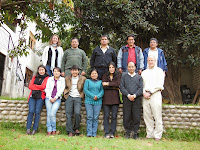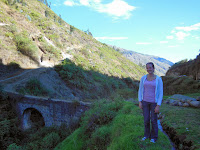In the summer I spent 3 weeks in Peru, visiting the project that I am going to return to in September, initially for 3 years.
I also visited another potential project in Bolivia. Here's the trip in pictures (click on the photos if you want to see a larger copy)...
Peru
I’ll be working with a local NGO called AIDIA (pronounced ‘idea’) that does community development work - mostly Bible translation, literacy, and church support and training. They want to expand the work they do and respond to practical needs in the communities, and have been looking for a water engineer for several years - so I will be starting up a Water Projects programme.
I’ll be based in Abancay - a large town in the Apurimac region in the Andes, close to the tourist destination of Cusco. AIDIA works in numerous indigenous villages in the area, which have their own culture and language, called Quechua (‘ketchwa’). They’re quite remote and often high up in the mountains - many have roads but the journey can take a couple of days.
I’ll be based in Abancay - a large town in the Apurimac region in the Andes, close to the tourist destination of Cusco. AIDIA works in numerous indigenous villages in the area, which have their own culture and language, called Quechua (‘ketchwa’). They’re quite remote and often high up in the mountains - many have roads but the journey can take a couple of days.
Many villages have a water system, but these are often in bad repair and there’s often not enough water or it’s not sufficiently clean. Sanitation is not in such good shape, with some villages not having any toilets at all. There is also a great perceived need for irrigation, with potential for tremendous economic benefits for the communities. I'll be using my experience in constructing and improving basic water and sanitation systems as well as providing training about how this affects health. I hope eventually to set up a programme that can tie into existing Peruvian government schemes and could be replicated by other local organisations.
So
this is Abancay - a town deep in the mountains, about 5 hours down from
Cusco. There seem to be street parades every couple of days, and all
the school kids turn out in amazing costumes.
There's a semi sort-of zoo in Abancay, where people bring animals which are being a nuisance... such as vicuñas - like llamas but really mean - and the original Paddington bear!
I
stayed with Rocio and her family (left) - in their extended family's
house. She works at AIDIA - the NGO I came to visit (staff photo on the
right). They started off translating the Bible into the local Quechua
dialect, and have expanded to include literacy work, training teachers,
church support, healthcare - now they want to be able to do water
projects as well.
I
started off getting used to the terrain by going to visit the water
supply system for part of Abancay, and discovered an old Spanish bridge
on the way.
Then
I was off to Mariscal Gamarra for a few days. It's about 80 miles and
it took 5 hours - here's the mountain pass on the way, and on the way
back!
We
visited several villages in Mariscal Gamarra, and I learned some more
about the Quechua way of building houses, working, cooking, living,
getting around...
The
point of the trip was to train literacy teachers, but I also took time
to chat to people about their water supply and needs, and visit some of
the local water systems. I ended up having to speak as part of a big
village meeting, giving advice on how they should deal with mining
companies who are coming to exploit the copper resources in the hills
and might contaminate the water - fortunately I am used to being asked
such things and was vaguely prepared!
My
next trip was to Rocio's home village - only 2 hours from Abancay but
surprisingly with no toilets at all - definitely something for the water
engineer to tackle... we only stayed for 1 day!
We
spent most of the day being shown the spring sources, talking about
management of the water system and talking to the women about
water-related disease issues. In the evening I was asked to preach in
the church - so I spoke about water (of course!) and how Jesus - like
water - is necessary for life, cleans us, helps us grow... This was one
of the things I really enjoyed in Ecuador so it was great to have the
opportunity to do it here.
The
region is called Apurimac which is Quechua for 'the God who speaks'.
While this is a culture that has many different gods, I really do find
the mountains in this region speak of God's glory.
At
the end of my time in Peru, I spent 2 days in Lima which I'd not really
visited before. It was great to see it by daylight, meet up with
Raquel and Juancito who I knew from 10 years ago, and dip my feet in the Pacific.
Bolivia
This
is Potosi - one of the oldest Spanish cities of South America, with
Cerro Rico - the rich hill, where they mined the silver which finances
so much of the Spanish empire. Here in particular there is lots of
syncretism - where old Quechua beliefs have been mixed up with the new
Catholic beliefs.
I
stayed with Eysel and her daughter - Eysel works at CEMFY - a new
clinic in the city, aiming to provide quality healthcare and eventually
to create a non-profit organisation working alongside which would do
community development work and water projects.
I
was encouraged to get to know Potosi's history, so I went on a tour of
the working mines - it was fascinating to meet some of the miners and
understand a bit more of what life is like. It was also interesting to
discover that I don't cope well with dusty air and heat at 4000m
altitude - they looked after me well though before I could faint!
I
visited a couple of areas where CEMFY has links - finding out about
life, water, and what the opportunities are. Things are hugely varied -
some have a complete solar powered water pumping and distribution
system, others have a single shared tap for the whole village and no
access to further funding. Particularly on the outskirts of Potosi
itself, there are informal and very crowded settlements which, because
they have no official population, have little hope of new
infrastructure.
I
also visited Yawisla, where my hosts used to live. it's now a
semi-holiday home for them, but there is lots to do in irrigating the
garden and getting called out on medical emergencies - we used the car
as an ambulance to get a lady with cancer to the medical centre. She
was only my age.







































